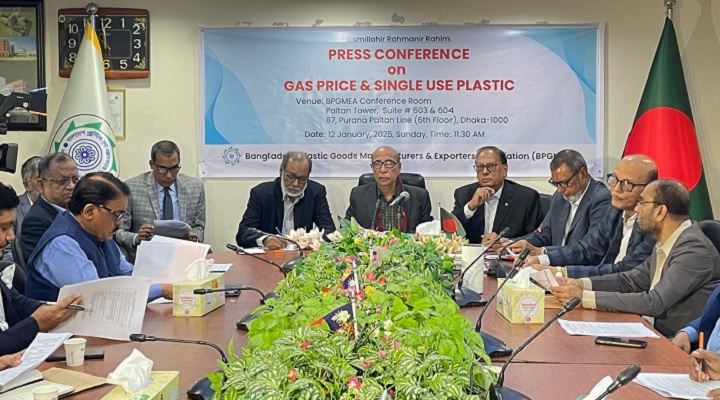Published: / Times Read

The Bangladesh Plastic Goods Manufacturers and Exporters Association (BPGMEA) has expressed concern that the ban on single-use plastics could severely impact the industry, affecting investments in over 6,000 plastic manufacturing units and leading to potential job losses for several hundred thousand workers.
During a press conference on Sunday (January 12), BPGMEA raised concerns regarding the government's decision to increase gas prices and implement the ban on single-use plastics.
BPGMEA President Samim Ahmed stated that efforts to ban single-use plastic products would severely damage the plastic industry and its linked sectors. He noted that the law would create barriers to industrial growth and could lead to negative reactions in the market.
He also pointed to the previous ban on plastic shopping bags in 2002, which led to the closure of 300 large plastic bag factories, resulting in job losses for many workers.
The BPGMEA further reported a 12.5% increase in exports in the first half of the year (July-December), with total exports reaching $24.62 billion, up from $21.88 billion in the previous year. Despite the growth in exports, inflation has remained above 10% for the past nine months, causing the prices of everyday goods to rise, putting pressure on consumers.
The press conference also highlighted other challenges, including the closure of 200 factories due to the fuel crisis, with another 300 factories at risk. Additionally, an increase in VAT on 43 types of pr oducts and services, including clothing, AC restaurants, non-AC hotels, and sweets, was criticized as a decision that would decrease consumers' purchasing power and further burden businesses.
The rising dollar exchange rate, which currently stands at 121.95 BDT per USD, was also noted as a continuing issue from the previous government's tenure, with the ongoing dollar crisis causing disruptions in business operations.
In response to the proposed ban on single-use plastics, BPGMEA has suggested alternative solutions:
Recycling of Plastics: Transform plastic waste into resources through recycling, which would help mitigate global warming and reduce ocean plastic pollution.
Economic Impact Assessment: The government should assess the economic impact of the ban in consultation with the Ministry of Commerce, the Ministry of Industry, BIDA, FBCCI, and other stakeholders.
Implementation by 2030: Following the United Nations’ regulation to ban single-use plastics by 2030, the government should take gradual steps towards its implementation.
Impact on GDP and Foreign Investment: BPGMEA cautioned that banning 17 types of products could lead to a decline in GDP and discourage foreign investment, as foreign companies would be forced to leave if packaging is no longer allowed.
The association has urged the government to consider these points before moving forward with the ban.